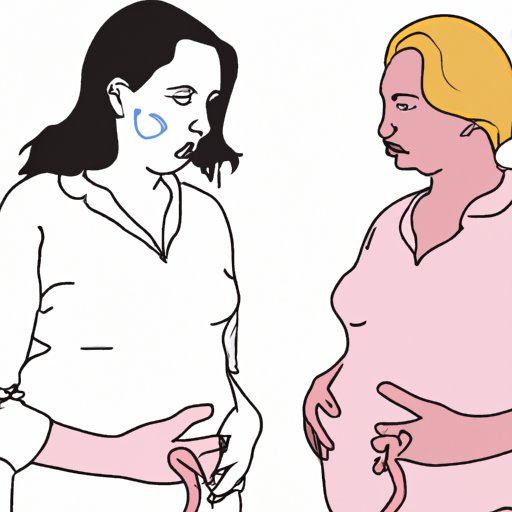
I. Introduction
Uterine cancer is one of the most common types of gynecological cancer, affecting thousands of women each year. Understanding the symptoms of uterine cancer is essential for early detection and treatment. With early intervention, the chances of recovery and survival for uterine cancer patients are much higher. Therefore, it’s crucial to stay informed about the warning signs of uterine cancer to ensure prompt medical attention if necessary.
II. 10 Warning Signs of Uterine Cancer You Need to Know
Here are the ten most common symptoms of uterine cancer:
- Heavy or prolonged vaginal bleeding: This is the most common symptom of uterine cancer. If you experience this, it’s crucial to seek medical attention immediately.
- Abnormal vaginal discharge: Any significant change in vaginal discharge, such as a foul odor, unusual color, or consistency, may indicate an issue that requires attention.
- Pelvic pain: Pain in the pelvic region or lower abdomen may occur due to various reasons, including uterine cancer.
- Painful intercourse: This may be accompanied by bleeding or discomfort during or after intercourse, and it may indicate a problem that requires medical attention.
- Swelling or pain in the abdomen or pelvis: Any swelling, lump, or pain in the abdominal or pelvic area should be investigated by a doctor.
- Unexplained weight loss: Dramatic and unexplained weight loss could be indicative of an underlying health condition, such as uterine cancer.
- Fatigue: Feeling constantly tired or exhausted, even after getting enough sleep, is another symptom that requires medical investigation.
- Changes in bowel or bladder habits: If you experience persistent constipation, diarrhea, or an urgent need to urinate, it could be a sign of uterine cancer.
- Pain or discomfort during urination: If you experience pain, burning, or discomfort during urination, you should consult a doctor, as it could be indicative of an underlying condition.
- Anemia: Low levels of iron in the blood, often indicated by fatigue and weakness, may occur in women with uterine cancer.

III. Recognizing the Early Symptoms of Uterine Cancer
Early detection is critical for uterine cancer treatment. Women should perform regular self-examinations and meet with a gynecologist annually for check-ups, especially if they have a higher risk of developing uterine cancer. Here are some tips for recognizing the early symptoms of uterine cancer:
- Perform regular self-exams: Women should perform regular breast exams and check their vaginal area for any unusual discharge or bleeding.
- Pay attention to changes in your body: Be aware of any changes or symptoms that are out of the ordinary for your body.
- Meet with a gynecologist regularly: A gynecologist can provide support, advice, and check-ups to ensure you’re healthy.
IV. The Silent Symptoms of Uterine Cancer: How to Detect Them
Some symptoms of uterine cancer may be silent, meaning they may not present with any obvious signs. However, it’s crucial to pay attention to your body and seek medical attention if you notice any changes or symptoms. Common silent symptoms of uterine cancer include:
- Bloating or a sense of fullness in the stomach
- Back pain or leg pain
- Difficulty urinating or pain during urination
Doctors may use medical tests like ultrasound, biopsy, and blood tests to detect uterine cancer in its early stages.
V. What Every Woman Should Know About the Symptoms of Uterine Cancer
Uterine cancer is one of the most common types of cancer in women. Risk factors for uterine cancer include age, obesity, an unbalanced diet, and a genetic predisposition. Symptoms of uterine cancer are often subtle and can resemble other health issues. Therefore, it’s crucial to know your body and recognize any changes that occur, as early detection can save lives.
VI. Unusual Signs of Uterine Cancer You Shouldn’t Ignore
In addition to the typical symptoms of uterine cancer, some women may experience less common indicators. These include:
- Back pain or lower abdominal pain that is not related to menstruation
- Painful or difficult urination
- Persistent swelling or a lump in the pelvic region
- Bleeding after menopause
If you experience any of these symptoms, it’s crucial to seek medical attention immediately.
VII. How to Recognize the Symptoms of Uterine Cancer in Menopausal Women
Menopause is a natural process that occurs when a woman’s hormonal levels decrease, and her menstrual cycle ceases. Changes in hormonal levels may also affect the prevalence of uterine cancer in menopausal women. Symptoms of uterine cancer in menopausal women may include:
- Bleeding after menopause
- Abnormal vaginal bleeding or spotting
- Bloating or discomfort in the abdominal area
- Pain or discomfort during sexual intercourse
If you’re experiencing any of these symptoms, you should consult with your doctor for a check-up.
VIII. Understanding the Symptoms of Uterine Cancer: A Guide for Women of All Ages
It’s essential to be aware of the warning signs of uterine cancer, regardless of your age. Some tips for recognizing uterine cancer symptoms include:
- Perform regular self-examinations
- Discuss your family history with your doctor
- Attend regular check-ups with your gynecologist
- Pay attention to changes in your body
If you experience any unusual symptoms or are concerned about your risk for uterine cancer, you should see a medical professional immediately.
IX. Conclusion
Understanding the symptoms of uterine cancer is an essential part of maintaining women’s health. Regular self-examinations, gynecological check-ups, and awareness of the warning signs can help with early detection and treatment. By staying vigilant and informed, women can take control of their health and lead healthy, fulfilled lives.




